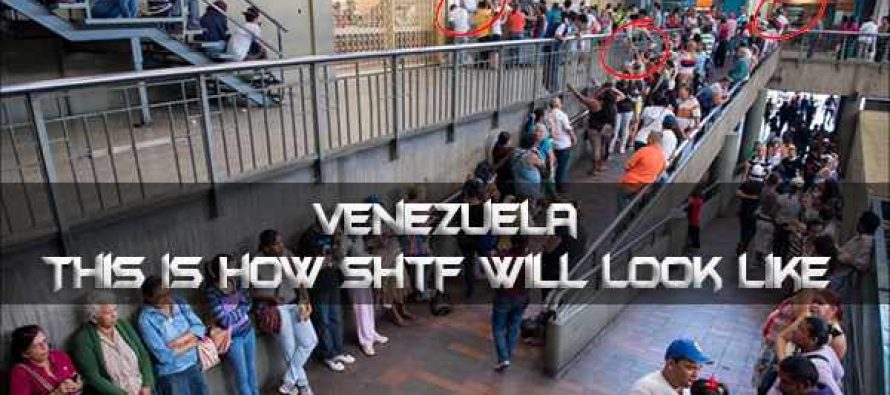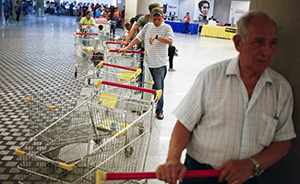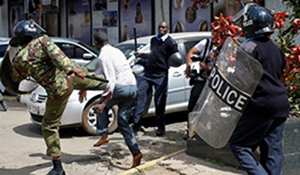Venezuela: This is How SHTF Will Look Like
By C. DavisJuly 15, 2016 11:54

Two years ago, Venezuela was a normal functioning nation, relatively speaking of course. It was by no means a free country, but the people still had a standard of living that was higher than most developing nations. Venezuelans could still afford the basic necessities of life and a few luxuries too.
 They could send their children to school and expect them to receive a reasonably good education, and they could go to the hospital and expect to be effectively treated with the samemedical standards you’d find in a developed nation. They could go to the grocery store and buy whatever they needed, and basic government services like law enforcement and infrastructure maintenance worked fairly well. The system was far from perfect, but it worked for the most part.
They could send their children to school and expect them to receive a reasonably good education, and they could go to the hospital and expect to be effectively treated with the samemedical standards you’d find in a developed nation. They could go to the grocery store and buy whatever they needed, and basic government services like law enforcement and infrastructure maintenance worked fairly well. The system was far from perfect, but it worked for the most part.
However, this standard of living was a mirage. Venezuela was and still is a leftist socialist nation, and the only thing propping it up was their glut of oil reserves and $100 per barrel prices. The state-owned those resources and they provided so much wealth that even Venezuela’s highly inefficient command economy could provide everything the people needed. But socialist systems do not by their nature, respond well to shock and disruptions. They’re not flexible.
As soon as the price of oil fell, the country started crumbling rapidly. The infrastructure has fallen apart, leading to rationing of both water and electricity. Inflation is out of control. Price controls have led to shortages of basic necessities. Crime is skyrocketing, and vigilante mob violence is now commonplace. All of these trends have been building over the past two years, but they have finally reached a crescendo over the last few weeks:
- What really kicked Venezuela’s slow motion collapse into high gear, was when their inflationary currency reached an absurd new level. At the end of April, it was reported that the government couldn’t print enough money to keep up with inflation. Their cash is printed overseas, and the central bank was so short on funds that they could no longer afford to pay the manufacturers of their cash. Venezuela literally doesn’t have enough money to buy more money.
- The government began scheduling rolling blackouts to save energy, which eventually led to riots in some areas. President Maduro ordered all 2.6 million of the nation’s public sector employees to only work 2 days a week for the duration of May, in an effort to save electricity.
- An autocratic regime can hold onto power for a very long time, so long as their soldiers and cops are well fed and paid. That’s certainly not the case in Venezuela, where on May 5th it was reported that 6 soldiers were arrested for stealing goats, because there was no more food in their barracks.
- As shortages of every necessity you can imagine run rampant, many Venezuelans are now so hungry that they’ve resorted to hunting down cats, dogs, and pigeons. In their desperation, many have turned to stealing from their neighbors, which often doesn’t end well in a society teetering on the brink. One mugger was caught by a mob, beaten, and set on fire before the police could show up.
 5000 people reportedly stormed a grocery store after they heard that the store might have a few items that couldn’t be had elsewhere. Only a handful of police officers were on the scene to control the crowd, one of who was beaten by the mob. 2 people were killed, dozens were injured, and millions of dollars in property damage was caused. And that was just worst case seen in recent weeks in the country, which has seen countless lootings of grocery stores, pharmacies, and shopping malls.
5000 people reportedly stormed a grocery store after they heard that the store might have a few items that couldn’t be had elsewhere. Only a handful of police officers were on the scene to control the crowd, one of who was beaten by the mob. 2 people were killed, dozens were injured, and millions of dollars in property damage was caused. And that was just worst case seen in recent weeks in the country, which has seen countless lootings of grocery stores, pharmacies, and shopping malls.- Venezuela’s hospitals are turning medieval due to a lack of power and supply shortages. People are dying from easily preventable diseases, and in some cases, the doctors themselves are looting the hospitals and selling expensive medical equipment on the black market. Equipment we take for granted like x-ray machines and kidney dialysis machines are in disrepair, as injured patients lay on the floor in pools of their own blood, waiting to be given a bed. Children are being hurt the most from this situation. The infant mortality rate has risen from .02% in 2012 to 2% in 2015, a hundred fold increase. It is no doubt far worse a year later.
- The Maduro regime is beginning to crack under the pressure, as the collapse of his government rapidly approaches. A state of emergency has been extended for another 60 days as the state seizes crippled factories and arrests their owners. Maduro has claimed that the US government is threatening to overthrow him at the behest of the nation’s far right. Anonymous US officials responded by saying that they believe his regime won’t last through the summer:
In Washington, the US intelligence officials told reporters they believed a crisis was imminent.“You can hear the ice cracking. You know there’s a crisis coming. Our pressure on this isn’t going to resolve this issue,” said one official.Another said: “This is really not the case that the US is rooting for any outcome other than there not be an economic meltdown or social violence. There are reasons for concern that over the summer as Venezuela gives importance to payments on debt over imports that these events could spiral.”
 If you’re a prepper, pay close attention to what happens next. What’s playing out in Venezuela right now is the kind of worst case scenario that many of us have been preparing for in the US. It should be very informative. It just goes to show that if you live under a corrupt authoritarian government that can’t manage its resources, all it takes is a heavy ripple in the global economy to send the whole system careening over a cliff.
If you’re a prepper, pay close attention to what happens next. What’s playing out in Venezuela right now is the kind of worst case scenario that many of us have been preparing for in the US. It should be very informative. It just goes to show that if you live under a corrupt authoritarian government that can’t manage its resources, all it takes is a heavy ripple in the global economy to send the whole system careening over a cliff.
I wouldn’t say the US government is in nearly as bad of shape as Venezuela’s. We have corruption, waste, and a degree of tyranny, though perhaps not on the same scale. But then again, Venezuela didn’t seem to be in very bad shape a few short years ago. Under the right circumstances, any government can collapse, and our system has many of the same vulnerabilities as theirs. All that means is that it would take a larger event to cripple our nation.
If you’re curious about what that may look like, keep your eyes on Venezuela for the next few months. They’re about to become the 21st-century poster child for how easy it is for socialist pseudo-democratic governments to collapse, and drag their citizens along with them. And unfortunately, the differences between our system and theirs aren’t that vast.


No comments:
Post a Comment